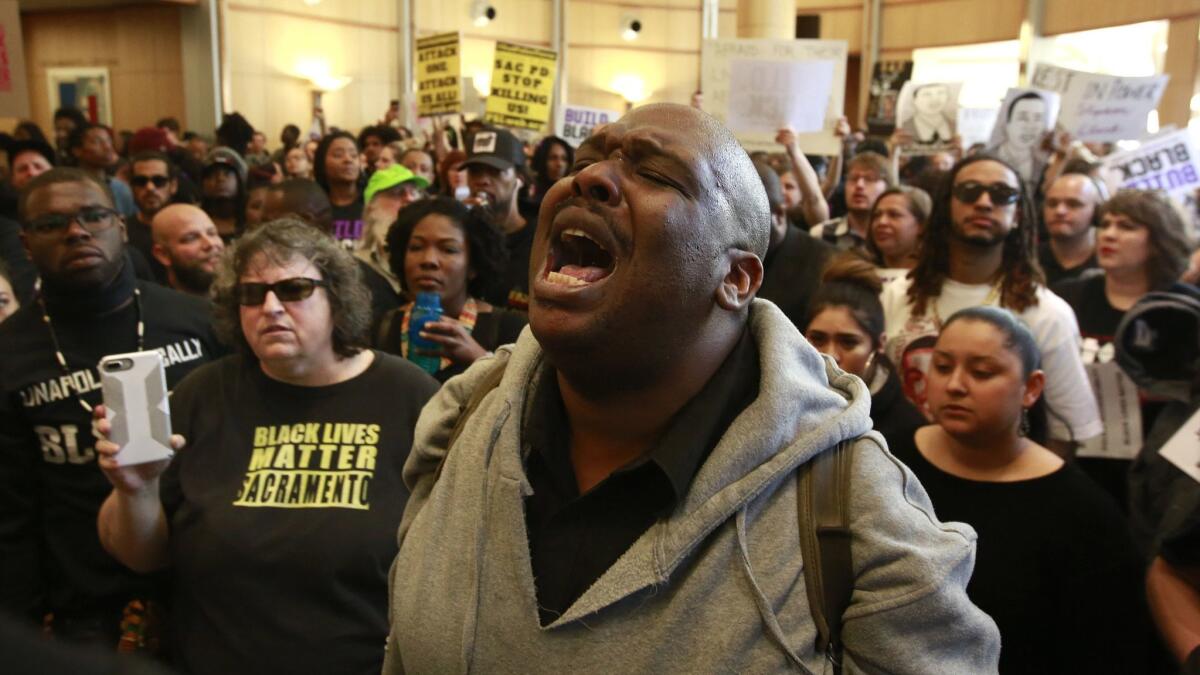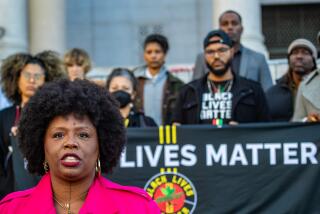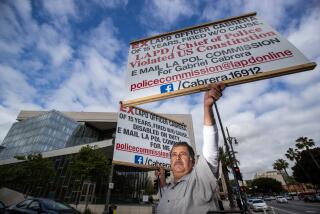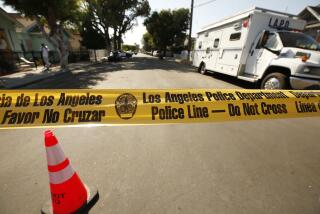Column: After the killing of Stephon Clark, police need to finally stand up and say: ‘Enough’

Say his name: Stephon Clark. Unarmed black man killed by Sacramento police in his grandmother’s backyard. Smeared as a hoodlum who shouldn’t have run from the law. Eulogized as the latest needless casualty of trigger-happy officers.
Thousands have marched in protest since Clark’s death March 18. Their chants and signs invoke the memory of other unwilling martyrs in the movement for police reform: Michael Brown, Oscar Grant, Alton Sterling, Eric Garner, Philando Castille, Walter Scott and too many more.
Here are two other California names: Jerry Lee Amie and Julian Alexander. They were also killed by police at their homes — Amie in 1970 in South Los Angeles, Alexander in Anaheim in 2008. A look at their cases show that as bad as things seem now, there has been a small tipping of power when black men wrongly die at the hands of law enforcement.
I encountered Amie’s story because of the Center for the Study of Political Graphics, a nonprofit archive in Culver City. “To Protect & Serve? Five Decades of Posters Protesting Police Violence,” an exhibition curated from its collection of 90,000 posters, is on display at the Social and Public Art Resource Center in Venice until Saturday and will reopen May 5 at Mercado La Paloma south of downtown L.A. One of the featured prints has a picture of Amie’s corpse with: “WHY???? WHY????”
It’s on law enforcement to show the rest of us that they truly want to protect and serve, not shoot first and dare to proclaim themselves victims after.
Why? Los Angeles police gave the press a perfectly packaged tale: late one summer night they found the 24-year-old struggling with his sister in his front yard. Amie appeared to reach for his waistband, at which time they unloaded two shotgun blasts on him and riddled his body with 25 wounds. They found a toy pistol next to Amie, and also told the Los Angeles Times that the Army had kicked him out for being “mentally deficient.”
In fact, Amie had received an honorable discharge and a Purple Heart for his service in Vietnam. Family members claimed Amie was just hanging out in his front yard, and that officers planted the toy gun. The cover-up received national attention, from the New York Times to Jet magazine. Police Chief Ed Davis eventually called Amie’s death “tragic,” but not before hundreds of protesters took to the streets for weeks, especially after the Los Angeles County grand jury refused to indict any of the four officers involved and the Department of Justice declined to file any charges.
Amie’s case at least attracted attention. Alexander’s didn’t even get that. On Oct. 28, 2008, the 20-year-old heard a commotion in the front yard of his in-laws late at night and ran outside with a broomstick to chase off burglars. He found Anaheim Police Officer Kevin Flanagan, who shot him, then cuffed the newlywed as his pregnant wife looked on. Alexander died at the hospital. There were no protests for Alexander, no social media campaigns. No murals or memorials exist in his name; no sports stars took up his cause.
Anaheim’s then-police chief declared in a press conference that Alexander was “innocent of anything” and four years later Anaheim officials gave Alexander’s widow a $1.55-million settlement. But the Orange County district attorney’s office declined to file charges against Flanagan. Seven years later, the same officer was involved in the 2015 shooting death of Monique Dekkard, an African American woman. (He escaped criminal charges for that killing, too, although a jury found him and two other officers partially responsible for Dekkard’s death in a civil case.)
Will the officers who killed Clark be charged? We still don’t know. We do know that Clark’s death shows us that we’re no closer to having the police take honest responsibility for shootings than we were when Amie was killed in 1970. We are no closer to getting bad cops off the force than we were when Alexander was killed in 2008.
Clark’s supporters, however, have tools to seek justice that the families of Amie and Alexander never had. Police body camera video and helicopter coverage of his death exist. California Atty. Gen. Xavier Becerra has offered an independent review. There is a critical mass of activists who don’t just march with signs, but show up in the courtrooms and during city council meetings as the world watches. Enough, they say. Enough.
Police and their supporters will do what they’ve always done, which is to dismiss critics as radicals who don’t understand the thin blue line. Enough excuses. Right now, it’s on law enforcement to show the rest of us that they truly want to protect and serve, not shoot first and dare to proclaim themselves victims after. Enough, they need to say. Enough.
So here’s a thought: Every first week of May, a ceremony at the California Peace Officers’ Memorial Monument on the state Capitol grounds honors officers killed in the line of duty. Imagine the goodwill created if someone said aloud the names of Jerry Lee Amie, Julian Alexander, Stephon Clark, Monique Dekkard and others who suffered their fate?
Enough.
Twitter: @gustavoArellano
More to Read
A cure for the common opinion
Get thought-provoking perspectives with our weekly newsletter.
You may occasionally receive promotional content from the Los Angeles Times.











